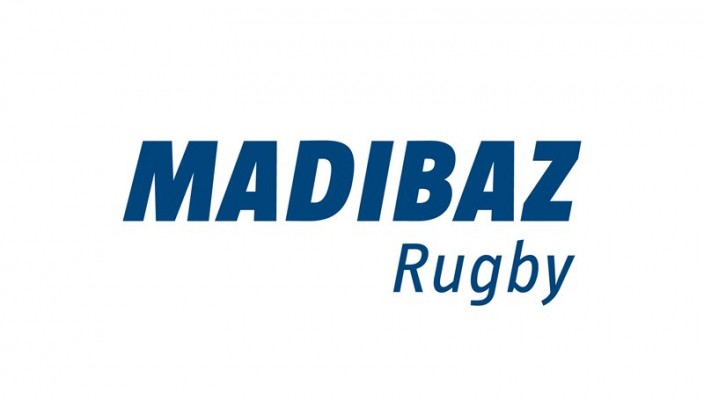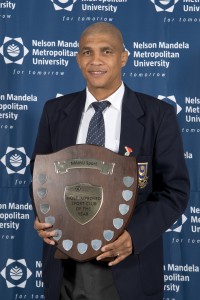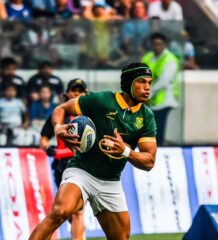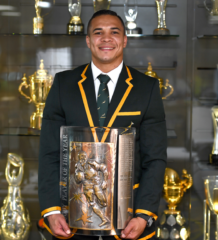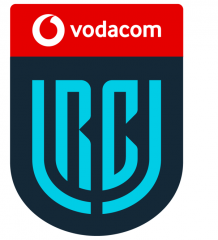Talking transformation at Bok Banter dinner
With transformation in rugby currently sparking national debate, a group of former South African players of colour will take their rightful place among their fellow Springbok alumni at the Madibaz Bok Banter gala event at the NMMU Indoor Sports Centre on September 3.
The event, which takes place in the run-up to this year’s Rugby World Cup, will see a number of rugby legends with connections to the university sharing their memories of and predictions for the international sporting tournament.
Among them will be 86-year-old Harold Wilson, who is honorary vice-president for life of the South African Rugby Union, and the manager of the 2007 Rugby World Cup-winning Springboks, Zola Yeye.
The pair will lead a line-up of little known national stars from the old Saru era that includes Bernard Petersen, Newton Kennedy and Anton Arendse.
All are former students of the old UPE, later NMMU, and all except administrative doyen Wilson obtained national colours in the 1980s.
As a non-racial sporting body, the original Saru kept itself independent of the “white” SA Rugby Board under Dr Danie Craven, which had its own separate development structures and sub-unions.
As Saru president, Wilson would play a key role in the unity talks with Craven that saw the two national unions merge at the start of the new democratic dispensation.
All Saru players were eventually awarded their Springbok blazers around the turn of the millennium.
“It was sentimental in a way, a great moment, but some of the guys didn’t accept their blazers,” said Madibaz sports manager Petersen, who will don his green and gold for the Bok Banter event.
According to him, wings Kennedy and Yeye and centre Arendse could all have made the Springbok side had they been allowed to compete on a level playing field.
“These guys were stars in their own class – they were all outstanding players,” he said.
Unhappily, said Petersen, Saru never captured individual player statistics and therefore there are no concrete facts to support comparisons today.
“This is the unfortunate thing for us, we don’t have the stats to prove that we’ve been there, done that.”
What they do have however is the collective memory of their many local fans who gathered to see their heroes play.
While Petersen, Kennedy and Arendse represented the former Eastern Province Rugby Union, which was based at the Adcock Stadium, Yeye turned out for their rival district body KwaZakhele Rugby Union (Kwaru), whose home field was Dan Qeqe Stadium.
“A game between Kwaru and EP could easily draw about 20 000 people,” recalled Petersen.
He said selection for the Saru national team had been based on competitions held countrywide, which saw players from provincial district unions competing in a number of pools.
“It was a big pool from which you were selected, so you really had to stand out.”
While the others stopped playing before unification, Petersen, now 49, finished his career in the new era of sport.
“I made the Springbok trials in ’92 and the SA Barbarians team but my golden years were with Saru.”
The flanker eventually hung up his boots in 1998.
With regard to the current transformation debate, Petersen said many people were unhappy with the way it had been carried out and that a number of black players had been overlooked.
“Heyneke Meyer says he’s focusing on the World Cup but structures should have been put in place long before.”
Ironically, he said, the unification of the sport and the accompanying era of professionalism had done much damage to the development of “black” rugby.
“Players were poached, a number of clubs merged and others became defunct. Some have reopened but they’ve never reached the heights that they did before unification.
“The old structures were more fertile ground for bringing players of colour through the ranks.”
Without the club structures available to develop junior talent, he believed schools rugby has suffered, especially in disadvantaged areas with poor facilities.
“The club set-up strengthened the school teams and a lot of rugby was being played in various leagues and competitions.”
With 50-50 representation envisioned in the 2019 national transformation plan, Petersen said the country was not going to make that target.
“We need to revisit the way rugby is managed at the moment and look at models that are working, such as Australia and New Zealand.
“A soccer-playing nation has beaten us this year. Danie Craven must be turning in his grave because he helped introduce the Argentinians to rugby!”
At the Bok Banter, Petersen and the Saru players will share the floor with other legends such as Hennie le Roux, Hannes Marais, Schalk Burger senior, Danie Gerber, Garry Pagel, Garth Wright and ex-Blitzbokke coach Paul Treu.
To hear more thoughts and opinions from these rugby heroes, the public is invited to attend the Bok Banter event, which will include a three-course meal and an auction of sporting memorabilia.
Bok Banter tickets are available at R350 per head or R3 500 for a 10-seater table. Book with Sheree van Rooyen on 041 504 4358 or sheree.vanrooyen2@nmmu.ac.za.
For more Bok Banter, go to Madibaz4U on Facebook and Twitter.
Related Posts
« Cape Town coaches benefit from Powerade Performance Academies KINGS, BLK IN APPAREL SPONSORSHIP DEAL »


